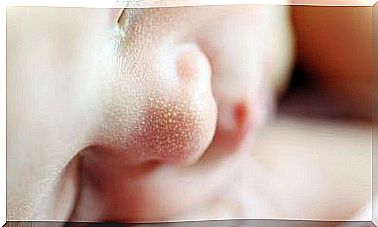When Should You Introduce Eggs To Children’s Diets?

Eggs should not be missing in your children’s diet. However, you need to know when and how to introduce eggs to them so that they can adapt well.
Eggs are rich in nutrients and provide an exceptional supplement of important ones during the first years of life. But can you give eggs to your children in all forms? No, but there are many options to choose from. We will explain more below.
Properties of eggs
Eggs consist of three parts: the shell, the yolk and the egg white. Together, yellow and white contain a high index of essential amino acids, fatty acids and other essential nutrients such as vitamins and minerals. In other words, the nutrients are well distributed between white and yellow.
Egg whites consist of 88% water and the rest are proteins. Of these, ovalbumin stands out. Therefore, we recommend that you only eat egg whites in certain types of diets. The egg yolk is rich in fats, mineral salts and proteins with many phosphates.

Benefits of introducing eggs into children’s diets
- Eggs contain many of the nutrients that are necessary for children to grow up and become strong.
- Eggs provide energy due to their high protein content.
- Due to their soft texture, they are easy to chew and digest.
- Eggs provide natural vitamin D to the body.
- Egg yolks contain monounsaturated fats. This means that they are not harmful to the body.
Thanks to these and several other benefits, it is important to introduce eggs into your children’s diet. Of course, the amount depends on the age of the child.
We must be careful to introduce eggs into their diet gradually. From the age of 6 months, we recommend that you start with the egg yolk, preferably boiled and without salt.
From the age of 10 months, you can give a whole egg in the form of scrambled eggs or omelette. You can also serve it hard-boiled. Be careful not to add spices. Do not give children fried eggs until they are over 12 months old.
When it comes to quantity, we need to be careful not to give them too much. In other words, give the baby half an egg when it is 6 months old, later a whole egg. It is not a good idea to give children more eggs than their weight allows.
Ideas for introducing eggs into children’s diets
Egg-nest with spinach and cheese
Ingredients
- 1 egg
- Butter
- Cheese (to taste)
- Spinach puree
- Onions (optional)
Cooking
- Crack the egg, beat it and set it aside.
- Fill greased muffin tins halfway with spinach puree.
- Make a pit in the spinach puree with a large spoon.
- Pour a little beaten egg into each hole.
- Sprinkle with the cheese and place them in a water bath.
- Place it in the oven for 15 minutes until the eggs are cooked.
Colorful tortillas
Ingredients
- 2 eggs
- 1 boiled carrot
- 1 boiled beetroot
- 4 spinach leaves
- 1 tablespoon oil
Cooking
- Crack the egg.
- Pour equal parts of the whipped mixture into three different bowls. Add the cooked carrot to one of the bowls and mix. Set it aside.
- Repeat the same process with the beetroot and the chopped spinach leaves in the two remaining bowls.
- Add a tablespoon of oil to a small hot frying pan.
- Pour in each mixture separately and cook colorful tortillas.

Omelette – an easy way to introduce eggs
Ingredients
- 1 potato
- 2 eggs
- 1 tablespoon oil
- Cheese to taste
Cooking
- Cut the potatoes into small pieces and put them in the oil.
- Whisk the eggs. Then mix them with the potatoes and add cheese.
- Place the whole mixture in a frying pan. When the omelette is cooked through on one side, turn it over with a plate so that it gets a nice color on both sides.
Nowadays, you can also find egg powder on the market. But these are usually only used for baking. Most people do not use this as part of their regular diet. Even if you can do it if you want.
When consumed in moderation, eggs can be a great complement to your children’s diet. They contribute to their nutritional intake and overall health.









